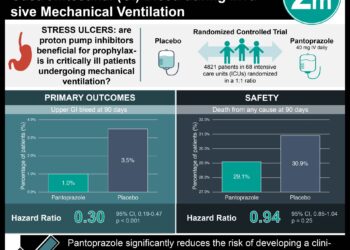Web-based decision aid fails to improve communication between clinicians and surrogates for patients with prolonged mechanical ventilation
1. A web-based decision aid was developed to help improve communication between clinicians and patient-surrogates for patients with prolonged mechanical ventilation.
2. Physicians and families had very different expectations about patients’ prognoses, and this did not improve with the decision aid. Forty three percent of surrogates reported that the program underestimated how aggressively they wanted to pursue treatment.
Evidence Rating Level: 1 (Excellent)
Study Rundown: When a patient is placed on prolonged mechanical ventilation, their families and physicians participate in a complex shared decision-making process to determine ongoing care. This study evaluated one tool which was designed to improve physician-surrogate communication. A web-based tool was used to introduce different end-of-life care strategies, evaluate family values, and predict the preferred care plan. This process was meant to inform and guide a more conventional “family meeting” between physicians and patient-surrogates. However, this study failed to demonstrate statistically significant improvements in metrics for surrogate comprehension, clinician-surrogate concordance, or surrogate mental health. Only about half of surrogates believed that the value prediction software accurately represented their views, and many felt that it underestimated how aggressively they wanted to pursue treatment. The authors discussed many possible explanations for these results, including surrogate’s skepticism for the tool, the late stage at which the tool was introduced, and poor integration of the tool into the subsequent family meeting. It is also possible that this strategy was overly reliant on the cognitive aspects of end-of-life healthcare decision-making, while undervaluing the emotional and psychological aspects. Though these results are not intrinsically promising, this trial represents the first multicenter randomized clinical trial for the application of a decision-making aid in an acute care setting.
Click to read the study in Annals of Internal Medicine
Click to read an accompanying editorial in Annals of Internal Medicine
Relevant Reading: A Randomized Trial of a Family-Support Intervention in Intensive Care Units
In-Depth [randomized controlled trial]: This study evaluated the effectiveness of a web-based decision-making aid for improving communication between the families of patients on prolonged mechanical ventilation and their families. Patient-surrogates were randomized into “intervention” and “treatment” conditions, where the “treatment” condition was to complete an electronic decision-making program on the day before the standard family meeting between physicians and families. This tool described three main treatment strategies balancing the goals of survival and comfort. The surrogate was shown information about the patient’s prognosis, and they were asked a number of questions about the patient’s values. Based on these results, an algorithm predicted which of the three models the surrogate would prefer, and the surrogate had a chance to respond. This was expected to help families prepare for the family meeting, allowing for more effective communication. However, there was no significant difference in the primary outcome of clinician-surrogate concordance (CSCS). Surrogates continued to substantially overestimate patient prognoses relative to physicians’ estimates and clinical models, and the gap only improved about 1.7%. Furthermore, only 53.1% of surrogates agreed with the predicted model, and 43% of surrogates favored more aggressive treatment than expected. At later time points, there was no evidence for improved surrogate mental health, measured symptoms of depression, anxiety, and posttraumatic stress. However, there was a modest but statistically significant reduction in “decisional conflict,” defined as surrogate uncertainty about the decision making process (p = 0.041).
Image: PD
©2019 2 Minute Medicine, Inc. All rights reserved. No works may be reproduced without expressed written consent from 2 Minute Medicine, Inc. Inquire about licensing here. No article should be construed as medical advice and is not intended as such by the authors or by 2 Minute Medicine, Inc.







